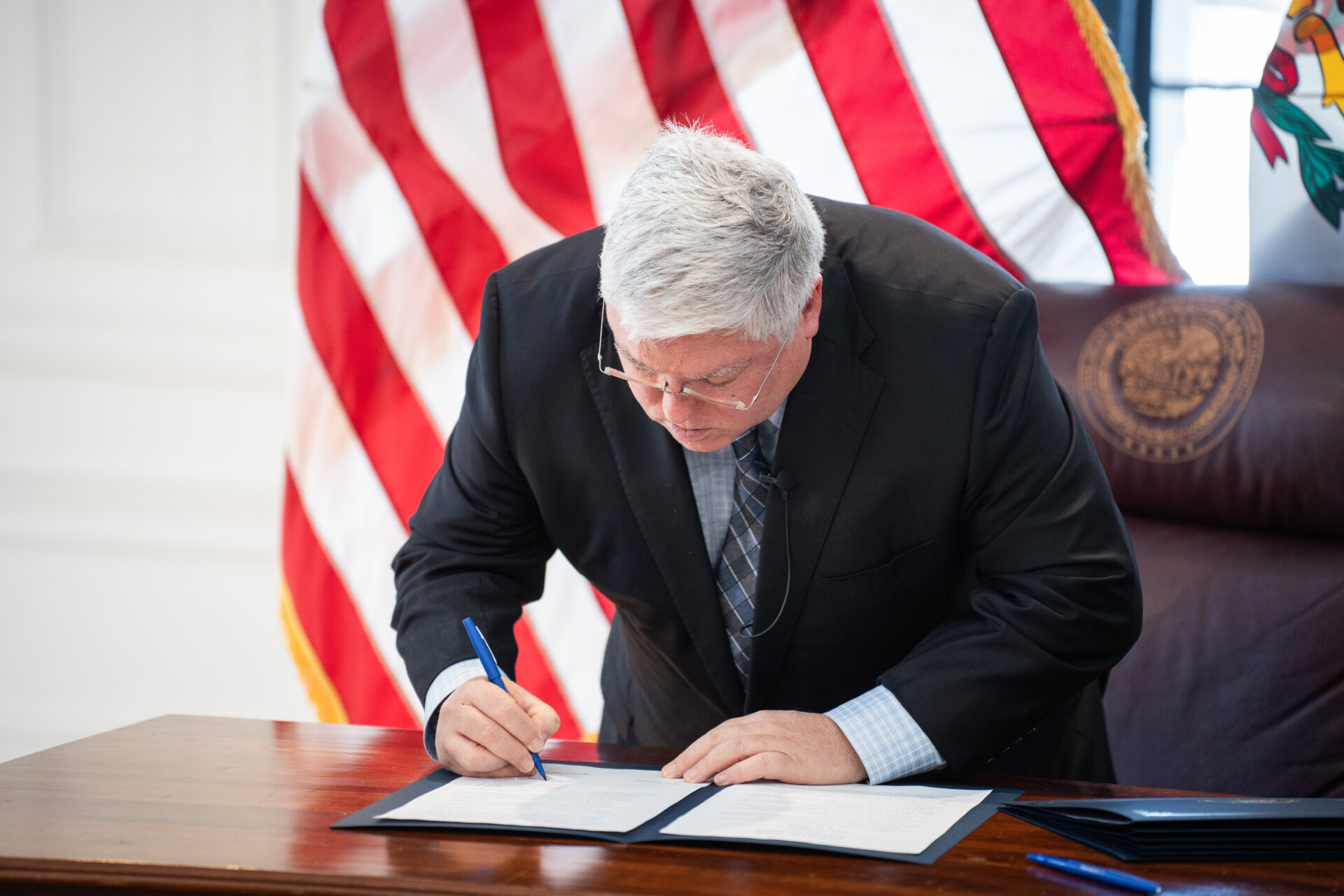After extensive review during this year’s legislative session, the state budget for fiscal year 2026 — beginning July 1 — received the governor’s stamp of approval Thursday.
But the version Gov. Patrick Morrisey signed into law strikes several funding allocations that lawmakers agreed upon when passing House Bill 2026. The governor gets a final review on bills before they become law, during which he can sign them into effect, veto them or let them pass into law by default.
Shortly after taking office in January, Morrisey’s office projected the state would experience a roughly $400 million budget deficit for the upcoming fiscal year, a figure they said could rise in future years.
Morrisey has attributed this to his predecessor, former Gov. Jim Justice, using one-time funding sources for ongoing expenses like Medicaid instead of finding long-term funding sources. Justice has denied the existence of a budget shortfall.
In a letter to Secretary of State Kris Warner outlining his objections to the legislature-passed budget, Morrisey repeatedly cited a need for “conservative budget planning” and “fiscal responsibility” in his reasoning for cutting certain areas of funding.
“It is imperative that we take steps to limit new spending,” Morrisey wrote.
In his final version of the state budget for fiscal year 2026, Morrisey changed budget amounts approved by the West Virginia Legislature as follows:
- Economic Development Project Fund: eliminated new funding entirely, which would have totaled $75 million.
- Road maintenance through the State Road Fund: reduced by $25 million to a final figure of $675.2 million new funds.
- Division of Highways surplus fund: reduced by $25 million to a final figure of $100 million new funds.
- Water Development Authority: eliminated new funding entirely, which would have totaled $10 million.
- West Virginia Department of Health, current expenses: cut by $3 million, more than half its funding provisions.
- Ronald McDonald House of Morgantown: cut by $3 million.
- A new computer science education program: cut by $1.4 million, removing most of the $2 million allocated to it by lawmakers.
- Court-appointed special advocates for youth experiencing alleged abuse or neglect: reduced by $800,000, leaving just $300,000 allocated from the bill next fiscal year.
- Public transit federal funds/grant match: reduced by $500,000.
- Ongoing library expense funds: reduced by $500,000, or roughly one-third of their allocated dollar amount.
- Martinsburg Berkeley Public Library: reduced by $500,000, or one-third of their allocated dollar amount.
- Military College Advisory Council Fund, which aimed to take steps toward establishing a military college in West Virginia: eliminated all $293,500 in funding. Morrisey said this should fall under capital projects overseen by the Higher Education Policy Commission.
- Safe Schools program: reduced by $200,000, with an additional $200,000 cut for “school mapping services.”
- Mountain State Digital Literacy Program: reduced by $300,000.
- Tourism industry development: reduced by $300,000.
- Green Acres Regional Center in Cabell County: had $300,000 in funding eliminated entirely, as Morrisey said no supporting documentation was included to justify this expense in the legislature’s bill.
- Mountwood Park in Wood County: had $300,000 in funding eliminated entirely, as Morrisey said no supporting documentation was included to justify this expense in the legislature’s bill.
- Lily’s Place, a residential treatment center for substance use disorder in Cabell County: $250,000 to be provided through the Cabell County Commission eliminated entirely.
- West Virginia University College of Law: new funding of $250,000 eliminated entirely.
- LPN to BSN nursing program at West Virginia State University: new funding of $250,000 eliminated entirely.
- Tuition contract program from the Higher Education Policy Commission: reduced by $208,000.
- Nursing homes for veterans under the Department of Veterans’ Assistance: reduced by $187,650.
- Trooper classes for West Virginia State Police: reduced by $161,172 after “consultation” with the agency.
- In-home family education services funding for the West Virginia Division of Human Services: reduced by $100,000.
- Local economic development assistance: reduced by $100,000. Morrisey said this funding source had money left over from previous years, and that executive-branch funding resources should share the weight of budget constraints for the coming fiscal year.
- Willow Bend Agricultural Innovation Center in Monroe County: stripped of the entire $100,000 set aside by lawmakers because Morrisey argued this funding was needed by Agriculture Commissioner Kent Leonhardt. Morrisey instructed Leonhardt to help the center identify other funding resources, he said.
- Math Counts educational program: had its entire $50,000 allocation eliminated.
These dollar amounts refer to the difference in budget allotments lawmakers had set aside for each program and the final figures Morrisey approved Thursday. They may not indicate an actual loss in money for each program, but rather a reduction in how much new funding each program will receive.
“I am hesitant to add funding to programs when the future challenges of West Virginia’s budget make it imperative that a cautious and prudent approach be taken,” Morrisey wrote in his letter to Warner.
Morrisey also struck language that would have prohibited the West Virginia Department of Human Services from transferring general revenue dollars between certain funding pools within the department.
The governor wrote that he was advised this would be “overly burdensome and restrictive” for the department, and that striking the language would help it more “efficiently allocate resources.”
